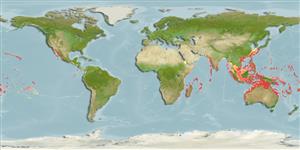Common names from other countries
Environment: milieu / climate zone / depth range / distribution range
Ecologia
marino associati a barriera corallina; distribuzione batimetrica 5 - 132 m (Ref. 89467), usually 6 - 30 m (Ref. 9710). Tropical; 32°N - 32°S
Indo-West Pacific: East Africa to the Hawaiian and Rapa Islands, north to southern Japan, south to Lord Howe Island. Southeast Atlantic: sometimes reaching the southeast coast of South Africa (Ref. 3141).
Size / Peso / Age
Maturity: Lm ? range ? - ? cm
Max length : 23.0 cm TL maschio/sesso non determinato; (Ref. 3141)
Spine dorsali (totale): 0; Raggi dorsali molli (totale): 9; Spine anali 0; Raggi anali molli: 9. Caudal fin rays 10. Strong spine on middle of dorsal ridge.
Inhabit clear outer lagoon and seaward reefs (Ref. 1602). Benthopelagic over rubble and sand at 5-132 m (Ref. 58302). Solitary (Ref. 90102). Males are highly territorial (Ref. 9710). Poisonous in some parts of the tropics (Ref. 7364).
Life cycle and mating behavior
Maturità | Riproduzione | Deposizione | Uova | Fecundity | Larve
Myers, R.F., 1991. Micronesian reef fishes. Second Ed. Coral Graphics, Barrigada, Guam. 298 p. (Ref. 1602)
IUCN Red List Status (Ref. 130435)
CITES (Ref. 128078)
Not Evaluated
Threat to humans
Venomous
Human uses
Pesca: di nessun interesse; Acquario: Commerciale
Informazioni ulteriori
BibliografiaAcquacolturaProfilo di acquacolturaVarietàGeneticaElectrophoresesEreditarietàMalattieElaborazioneMass conversion
Strumenti
Special reports
Download XML
Fonti Internet
Estimates based on models
Preferred temperature (Ref.
115969): 24.3 - 28.8, mean 27.5 (based on 776 cells).
Phylogenetic diversity index (Ref.
82804): PD
50 = 0.5625 [Uniqueness, from 0.5 = low to 2.0 = high].
Bayesian length-weight: a=0.03548 (0.01700 - 0.07404), b=2.81 (2.62 - 3.00), in cm Total Length, based on LWR estimates for this (Sub)family-body shape (Ref.
93245).
Trophic level (Ref.
69278): 3.0 ±0.0 se; based on diet studies.
Resilienza (Ref.
120179): Alto, tempo minimo di raddoppiamento della popolazione meno di 15 mesi (Fec assumed to be > 10,000).
Fishing Vulnerability (Ref.
59153): Low vulnerability (13 of 100).
